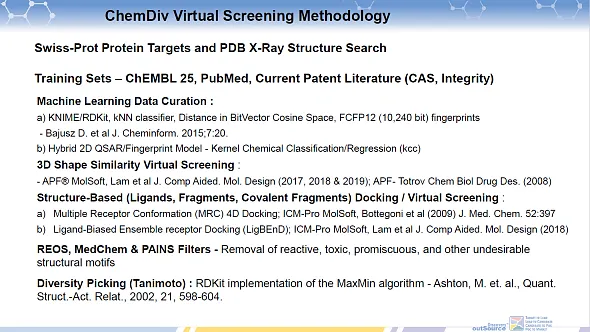Protein Tyrosine Phosphatase Non-receptor Type (PTPN) Targeted Library
ChemDiv’s library of small molecule compounds targeting non-receptor-type protein tyrosine phosphatases comprises 32,596 entries.
Protein tyrosine phosphatases (PTPs) are signaling molecules that regulate various cellular processes, including cell growth, differentiation, mitotic cycle, and oncogenic transformation. The N-terminal part of these PTPs contains two tandem Src homology (SH2) domains, which act as protein phospho-tyrosine binding domains and mediate the interaction of these phosphatases with their substrates. PTPs are a group of enzymes that remove phosphate groups from phosphorylated tyrosine residues on proteins. Protein tyrosine (pTyr) phosphorylation is a widespread post-translational modification that can create new recognition motifs for protein interactions, influence cellular localization, affect protein stability, and regulate enzyme activity.
Maintaining an appropriate level of protein tyrosine phosphorylation is crucial for many cellular functions. Tyrosine-specific protein phosphatases catalyze the removal of a phosphate group from tyrosine residues using a cysteinyl-phosphate enzyme intermediate. Those enzymes are key regulatory components in signal transduction pathways, such as the MAP kinase pathway, and play a vital role in cell cycle control. They are essential in the regulation of cell growth, proliferation, differentiation, transformation, and synaptic plasticity.
The mechanism of action of drugs targeting non-receptor-type protein tyrosine phosphatases (NRPTPs) typically involves inhibiting the phosphatase activity of these enzymes. By doing so, they maintain or increase the phosphorylation status of key signaling proteins within the cell. This can lead to the modulation of signaling pathways that are dysregulated in diseases. For example, in cancer, certain NRPTPs might act as tumor suppressors, and their inhibition can lead to unchecked cell proliferation and tumor growth. Conversely, in cases where NRPTPs are overactive, leading to the dephosphorylation and inactivation of important signaling molecules, inhibitors can restore normal signaling and function.
The therapeutic indication of drugs targeting NRPTPs varies based on the specific phosphatase and its role in disease. For instance, in cancer therapy, inhibitors of NRPTPs that are overexpressed or mutated in certain cancers could be used to restore normal cell signaling and inhibit tumor growth. Similarly, in autoimmune diseases or inflammatory conditions where NRPTPs might contribute to abnormal immune responses, their inhibition can help in re-establishing immune balance.
It's important to note that the development of NRPTP inhibitors is challenging due to the need for specificity. The inhibitors must selectively target the pathological NRPTPs without affecting the broader family of phosphatases to avoid unwanted side effects.
Our library of small molecule compounds targeting NRPTPs is a significant asset in drug discovery, offering a focused collection of compounds for targeting key enzymes in critical signaling pathways. By providing selective inhibitors of NRPTPs, our library makes it possible to modulate specific cellular processes implicated in a variety of diseases, including cancer, autoimmune disorders, and metabolic diseases. The diversity of the compounds within the library allows for the exploration of a range of pharmacological profiles, enhancing the probability of identifying molecules with high efficacy and minimal side effects. Furthermore, this library serves as a valuable tool for understanding the complex roles of NRPTPs in disease pathogenesis, thereby facilitating the development of novel therapeutic strategies with potential for high clinical impact.
